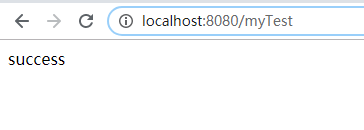springboot工具类中读取配置文件
1、创建配置文件(application.properties)
spring.activemq.broker-url=tcp://localhost:61616 spring.activemq.user=admin spring.activemq.password=admin spring.activemq.in-memory=true spring.activemq.pool.enabled=false
2、创建工具类(PropertiesUtil.java)
package com.jeff.utils;
import java.io.IOException;
import java.util.Properties;
import org.springframework.core.io.ClassPathResource;
import org.springframework.core.io.support.PropertiesLoaderUtils;
public class PropertiesUtil {
private static String user;
static {
System.out.println("application.properties属性文件读取开始");
ClassPathResource resource = new ClassPathResource("application.properties");
try {
Properties properties = PropertiesLoaderUtils.loadProperties(resource);
user = properties.getProperty("spring.activemq.user");
System.out.println("user的值:" + user);
} catch (IOException e) {
System.out.println("application.properties属性文件读取异常" + e);
}
System.out.println("application.properties属性文件读取完成");
}
public static String getUser() {
System.out.println("获取user的值:" + user);
return user;
}
}
3、创建测试类(MyController.java)
package com.jeff.controller;
import org.springframework.web.bind.annotation.RequestMapping;
import org.springframework.web.bind.annotation.RestController;
import com.jeff.utils.PropertiesUtil;
@RestController
public class MyController {
@RequestMapping("myTest")
public String myTest() {
PropertiesUtil.getUser();
return "success";
}
}
4、打开浏览器访问 http://localhost:8080/myTest,控制台输出结果


springboot读取配置文件到静态工具类
通常我们读取配置文件可以用@Value注解和@Configuration,@ConfigurationProperties(prefix = "xxx")等注解,但是这种方式是无法把配置读取到静态变量的,如果我们想在项目初始化时把配置文件加载到一个工具类,然后通过静态变量的方式调用的话我们就不能使用这两种方法。
这时候,我们可以用Environment 来解决
不废话了,直接上代码
import javax.annotation.PostConstruct;
import org.springframework.beans.factory.annotation.Autowired;
import org.springframework.core.env.Environment;
import org.springframework.stereotype.Component;
/**
*
* @Description: 配置常量类——根据不同的spring-profile加载不同的配置
* @author: eric.zhang
* @date: 2018年7月20日 上午10:59:24
*/
@Component
public class ConfigConstant {
@Autowired
private Environment env;
public static String url;
public static String param;
@PostConstruct
public void readConfig() {
url = env.getProperty("config.url");
param = env.getProperty("config.param");
}
}
我写完以后发现有些麻烦,下面是改进的方法,不需要每个配置都去get一下,只需要把配置文件的key与工具类的静态变量名写成一样的即可。
import java.io.UnsupportedEncodingException;
import java.lang.reflect.Field;
import javax.annotation.PostConstruct;
import org.springframework.beans.factory.annotation.Autowired;
import org.springframework.core.env.Environment;
import org.springframework.stereotype.Component;
/**
*
* @Description: 配置常量类——根据不同的spring-profile加载不同的配置,变量名要与配置文件里写的名一致
* @author: eric.zhang
* @date: 2018年7月20日 上午10:59:24
*/
@Component
public class ConfigConstant {
@Autowired
private Environment env;
public static String url;
public static String name;
@PostConstruct
public void readConfig() throws Exception {
String prefix = "config.";
Field[] fields = ConfigConstant.class.getFields();
for(Field field : fields ){
field.set(null, getProperty(prefix + field.getName()));
}
}
private String getProperty(String key) throws UnsupportedEncodingException {
return new String(env.getProperty(key).getBytes("ISO-8859-1"), "UTF-8");
}
}
大哥说这样写依赖spring, 单测调代码的时候不方便,所以又写了一个不依赖spring的版本。
import java.io.InputStreamReader;
import java.lang.reflect.Field;
import java.util.Properties;
/**
*
* @Description: 配置常量类——根据不同的spring-profile加载不同的配置
* 变量名把配置文件的key中的"."替换成"_"命名
* @author: eric.zhang
* @date: 2018年7月20日 上午10:59:24
*/
public class ConfigConstant {
public static String CONFIG_URL;
public static String CONFIG_NAME;
static {
try {
Properties props = new Properties();
props.load(new InputStreamReader(
ConfigConstant.class.getClassLoader().getResourceAsStream("application.properties"),
"UTF-8"));
String profile = props.getProperty("spring.profiles.active");
String envFile = "application-" + profile + ".properties";
Properties envProps = new Properties();
envProps.load(new InputStreamReader(
ConfigConstant.class.getClassLoader().getResourceAsStream(envFile), "UTF-8"));
Field[] fields = ConfigConstant.class.getFields();
for (Field field : fields) {
field.set(null, envProps.getProperty(field.getName().replace("_", ".").toLowerCase()));
}
} catch (Exception e) {
e.printStackTrace();
}
}
}
以上为个人经验,希望能给大家一个参考,也希望大家多多支持自学编程网。

- 本文固定链接: https://zxbcw.cn/post/219348/
- 转载请注明:必须在正文中标注并保留原文链接
- QQ群: PHP高手阵营官方总群(344148542)
- QQ群: Yii2.0开发(304864863)
